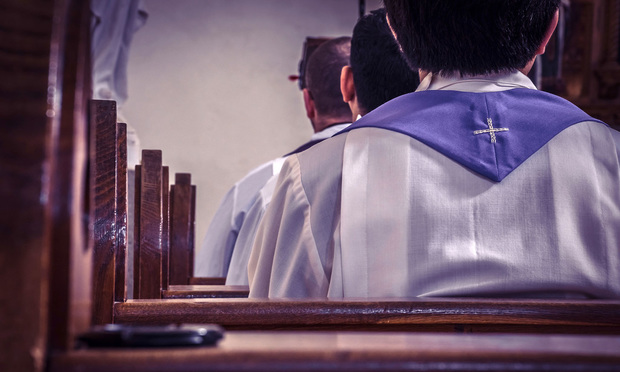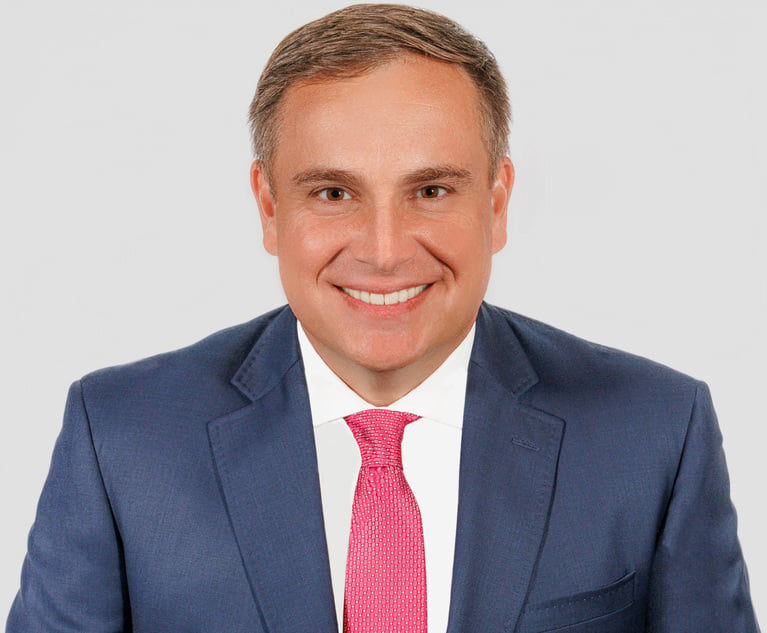Former Phila. DA, Other Legal Heavyweights to Oversee Archdiocese's Victim Reparations Fund
The Archdiocese of Philadelphia has established an out-of-court compensation fund for the victims of clergy sexual abuse, to be overseen by a cadre of former government officials, including onetime interim Philadelphia District Attorney Kelley Hodge.
November 08, 2018 at 02:38 PM
4 minute read
 Photo: Thoom/Shutterstock.com
Photo: Thoom/Shutterstock.com
The Archdiocese of Philadelphia has established an out-of-court compensation fund for the victims of clergy sexual abuse, to be overseen by a cadre of former government officials, including onetime interim Philadelphia District Attorney Kelley Hodge.
Hodge, along with former Philadelphia-based federal Judge Lawrence Stengel, sits on the church fund's Independent Oversight Committee, which is tasked with ensuring that the compensation program retains “autonomy” from the church. Former Senate Majority Leader George Mitchell will serve on the panel as well.
Last year, Hodge took over the District Attorney's Office when former DA Seth Williams was sent to prison after pleading guilty to taking bribes.
Additionally, Hodge was previously the University of Virginia's first Title IX coordinator—a post that was carved out following a sex scandal based on an article from Rolling Stone that was later retracted—and is no stranger to handling high-profile matters.
Another Philadelphia District Attorney's Office alum, John Delaney, is also involved with the “Independent Reconciliation and Reparations Program” as the head of its Office of Investigation. Delaney was formerly first assistant to Williams.
Delaney, a prosecutor for 36 years, worked in the DA's Office during the prosecution of Monsignor William Lynn, the first Catholic Church administrator to be convicted of endangering children—although his conviction was ultimately overturned by the Pennsylvania Supreme Court.
Lynn had served as secretary for clergy for the Archdiocese of Philadelphia, and in that role supervised priests including Edward Avery, who molested a 10-year-old altar boy and pleaded guilty in 2012 to involuntary deviate sexual intercourse and conspiracy to endanger the welfare of children.
Hodge and Delaney did not respond to requests for comment. Stengel, reached Thursday afternoon, said, “I am honored and pleased to serve on the Independent Oversight Committee for the Independent Reconciliation and Reparations Program,” reserving further comment for a press conference to be held next week.
Claims submitted to the fund—which is intended for those victims unable to file lawsuits because of the statute of limitations—will be administered by Kenneth Feinberg and Camille Biros.
Feinberg previously served as special master for the September 11th Victim Compensation Fund. He also administered the Aurora Colorado Victim Relief Fund, the BP Oil-Gulf Coast Claims Facility and the GM Ignition Compensation Claims Resolution Facility, among others.
Biros has worked as a claims administrator for compensation programs for the victims of clergy sex abuse in New York.
Archbishop Charles Chaput announced the fund on Thursday.
“The damage done to innocent young people and their families by sexual abuse in the past is profound,” Chaput said in a statement. “It can't be erased by apologies, no matter how sincere. Money can't buy back a wounded person's wholeness. But what compensation can do is acknowledge the evil done, and help survivors recover their dignity and peace.”
The Philadelphia Archdiocese's establishment of the fund comes in the wake of a bombshell grand jury report detailing 70 years of sex abuse in Pennsylvania dioceses that was released by state Attorney General Josh Shapiro in August. The report said that 301 priests had molested nearly 1,000 children during that time. It also pointed to a concerted cover-up effort orchestrated by the highest echelons of the church to make it all disappear.
Although the report names many of the abusive priests, it was redacted to remove the names of some of the alleged abusers who claim that the grand jury proceedings violated their due process rights. The Pennsylvania Supreme Court is set to decide whether the report will remain redacted in that way.
In response to the announcement of the fund on Thursday, Shapiro responded that it was an acknowledgement of wrongdoing by the church.
“It's now clear that the dioceses acknowledge the grand jury accurately unearthed horrific and extensive abuse and cover up and, as a result, victims deserve compensation no matter when their abuse happened,” Shapiro said. “However, the grand jury recommended that victims deserve their day in court—not that the church should be the arbiter of its own punishment. These undefined compensation funds do not give a pass to lawmakers—the Legislature should return to Harrisburg, do their jobs and pass the grand jury's four reforms.”
This content has been archived. It is available through our partners, LexisNexis® and Bloomberg Law.
To view this content, please continue to their sites.
Not a Lexis Subscriber?
Subscribe Now
Not a Bloomberg Law Subscriber?
Subscribe Now
NOT FOR REPRINT
© 2025 ALM Global, LLC, All Rights Reserved. Request academic re-use from www.copyright.com. All other uses, submit a request to [email protected]. For more information visit Asset & Logo Licensing.
You Might Like
View All


Ozempic Defendants Seek to Shave 'Tacked On' Claims From MDL Complaint
3 minute read
Lawsuit Against Major Food Brands Could Be Sign of Emerging Litigation Over Processed Foods
3 minute readTrending Stories
- 1Decision of the Day: Court Holds Accident with Post Driver Was 'Bizarre Occurrence,' Dismisses Action Brought Under Labor Law §240
- 2Judge Recommends Disbarment for Attorney Who Plotted to Hack Judge's Email, Phone
- 3Two Wilkinson Stekloff Associates Among Victims of DC Plane Crash
- 4Two More Victims Alleged in New Sean Combs Sex Trafficking Indictment
- 5Jackson Lewis Leaders Discuss Firm's Innovation Efforts, From Prompt-a-Thons to Gen AI Pilots
Who Got The Work
J. Brugh Lower of Gibbons has entered an appearance for industrial equipment supplier Devco Corporation in a pending trademark infringement lawsuit. The suit, accusing the defendant of selling knock-off Graco products, was filed Dec. 18 in New Jersey District Court by Rivkin Radler on behalf of Graco Inc. and Graco Minnesota. The case, assigned to U.S. District Judge Zahid N. Quraishi, is 3:24-cv-11294, Graco Inc. et al v. Devco Corporation.
Who Got The Work
Rebecca Maller-Stein and Kent A. Yalowitz of Arnold & Porter Kaye Scholer have entered their appearances for Hanaco Venture Capital and its executives, Lior Prosor and David Frankel, in a pending securities lawsuit. The action, filed on Dec. 24 in New York Southern District Court by Zell, Aron & Co. on behalf of Goldeneye Advisors, accuses the defendants of negligently and fraudulently managing the plaintiff's $1 million investment. The case, assigned to U.S. District Judge Vernon S. Broderick, is 1:24-cv-09918, Goldeneye Advisors, LLC v. Hanaco Venture Capital, Ltd. et al.
Who Got The Work
Attorneys from A&O Shearman has stepped in as defense counsel for Toronto-Dominion Bank and other defendants in a pending securities class action. The suit, filed Dec. 11 in New York Southern District Court by Bleichmar Fonti & Auld, accuses the defendants of concealing the bank's 'pervasive' deficiencies in regards to its compliance with the Bank Secrecy Act and the quality of its anti-money laundering controls. The case, assigned to U.S. District Judge Arun Subramanian, is 1:24-cv-09445, Gonzalez v. The Toronto-Dominion Bank et al.
Who Got The Work
Crown Castle International, a Pennsylvania company providing shared communications infrastructure, has turned to Luke D. Wolf of Gordon Rees Scully Mansukhani to fend off a pending breach-of-contract lawsuit. The court action, filed Nov. 25 in Michigan Eastern District Court by Hooper Hathaway PC on behalf of The Town Residences LLC, accuses Crown Castle of failing to transfer approximately $30,000 in utility payments from T-Mobile in breach of a roof-top lease and assignment agreement. The case, assigned to U.S. District Judge Susan K. Declercq, is 2:24-cv-13131, The Town Residences LLC v. T-Mobile US, Inc. et al.
Who Got The Work
Wilfred P. Coronato and Daniel M. Schwartz of McCarter & English have stepped in as defense counsel to Electrolux Home Products Inc. in a pending product liability lawsuit. The court action, filed Nov. 26 in New York Eastern District Court by Poulos Lopiccolo PC and Nagel Rice LLP on behalf of David Stern, alleges that the defendant's refrigerators’ drawers and shelving repeatedly break and fall apart within months after purchase. The case, assigned to U.S. District Judge Joan M. Azrack, is 2:24-cv-08204, Stern v. Electrolux Home Products, Inc.
Featured Firms
Law Offices of Gary Martin Hays & Associates, P.C.
(470) 294-1674
Law Offices of Mark E. Salomone
(857) 444-6468
Smith & Hassler
(713) 739-1250





